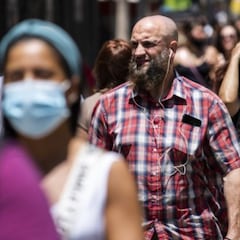What are the symptoms of long covid and who does it affect?
As the Omicon wave sweeps across the globe, scientists are looking closely at the effects of long covid and who is more susceptible and why.

The majority of people who contract covid-19 are fully recovered after a few weeks, with the virus completely out of their system and the number of antibodies to protect against a second coronavirus infection boosted. However, some people experience symptoms for considerably longer, including months after contracting covid-19, and these can be recurring and considerably higher in number than those associated with the coronavirus. Even those people who did not display symptoms days or weeks after initially catching covid-19 can still suffer from after effects after testing negative: this syndrome is known as post covid-19 condition, chronic covid-19 or simply long covid. As the Omicron variant sweeps the globe, health experts are working to compile more information on long covid, its effects on patient health, who is more susceptible and why.
See also: Researchers think taurine could help with long covid
Long covid symptoms
5/5 We not only need to increase vaccine access and vaccination among those most at risk, we also need to reduce the spread of #SARSCoV2 to prevent infections, reduce risk those infected developing severe disease, reduce risk of #longcovid and reduce risk of variants pic.twitter.com/EDHlanFttg
— Maria Van Kerkhove (@mvankerkhove) February 8, 2022
According to the World Health Organization (WHO), “long covid is still evolving but the condition can be very debilitating. It is associated with a range of overlapping symptoms including generalized chest and muscle pain, fatigue, shortness of breath, and cognitive dysfunction, and the mechanisms involved affect multiple system and include persisting inflammation, thrombosis, and autoimmunity.”
The effects of long-term hospitalization also play a part, with so-called post-intensive care syndrome causing potentially serious problems for patients who have spent a long time in the ICU. These can persist even after discharge and symptoms include These effects can include severe weakness, problems with reasoning and judgment, and post-traumatic stress disorder (PTSD).
Other symptoms of long covid are similar to those that emerge immediately after being infected with coronavirus, such as persistent coughing, mucus (in Omicron patients), fatigue and Costochondritis - the medical term for inflammation of the cartilage that joins your ribs to your breastbone.
Long covid symptoms
- Breathing difficulties
- Tiredness and fatigue
- Difficulty concentrating (also known as "brain fog")
- Persistent cough
- Stomach or chest pain
- Headaches
- Heart palpitations
- Muscle pain in the joints
- Paresthesia
- Diarrhea
- Difficulty sleeping
- Fever
- Dizziness
- Rashes
- Mood swings
- Loss of taste or smell
- Changes in the menstrual cycle
When can long covid emerge?
According to the WHO, a lack of symptoms after contracting covid-19 does not signify that they will not appear over time. Data shows that one-third of people who presented mild symptoms in the first few days after being infected continue to suffer long-term symptoms, while one in 10 people suffer persistent covid-19 symptoms for up to 12 weeks after they initially tested positive.
Related stories
In some patients, these symptoms can last for months. A recent University of California study showed that of a test group of people who displayed no symptoms in the 10 days after testing positive, 27% were suffering symptoms including abdominal pain and breathing difficulties up to 60 days later.
What has yet to be explained is why more men die from covid-related complications, but more women - just over 59% of all cases - suffer from long covid. It also remains a mystery why long covid affects people in all age groups, including children.

